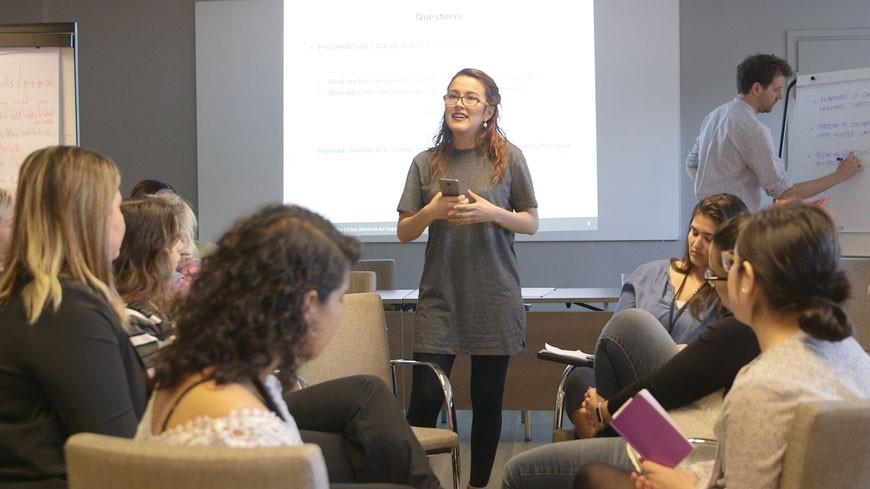#ItIsPossible: Lessons From Finland

In May, Teach For All network alumni from 23 countries met in Helsinki, Finland, to connect and share their projects while learning about one of the best educational systems in the world, the Finnish system. All of us work in fields related to developing or impacting public policy, and are members of the first and second cohorts of Teach For All’s Policy Community of Practice. Through the Community of Practice, we learn with and from peers around the world, critique and support each other’s work, and forge relationships that will sustain us over time.
The gathering in Helsinki was a learning trip that included sessions and presentations by renowned researchers, officials from Finland’s Ministry of Education, principals, teachers, and NGOs that provide support to education-related state initiatives. Together, this group of 44 alumni from around the world learned about Finnish educational policy and curriculum, their teacher training system, and their student well-being system, and visited municipal schools to talk with students and learn more about their educational experience.
Lessons Learned
For me, these were spectacular days, in which we slept very little but dreamed a lot. In most cases, it was the opportunity to meet for the first time people from countries we had only heard by name, like Bulgaria and the Philippines. Despite the time differences, the different ways of dressing and food preferences, and the different languages and accents, we were all connected by a beautiful and real purpose: to contribute to improving education in our countries through enhancing and developing educational policies.
Getting to know one of the best educational systems in the world was frustrating at first, because we saw how far our countries are from achieving a system like Finland’s. However, by the end of the first day, we reflected and were able to turn that frustration into motivation. Over the course of our time together in Helsinki, our diverse group became grounded in the following lessons we were learning:
- There is no single recipe. The Finnish system was not created out of thin air. Finnish school staff, principals, and teachers recognize that their system was born from the “combination” of good practices throughout Europe. They took what worked best in other countries and best suited their reality to imagine and design their nation’s education.
- Educational transformation takes time. In Finland, they did not build their education system overnight. The current Finnish educational system was re-defined after 16 years of constant research and discussion. Once ALL parties (students, parents, teachers, policymakers, companies, etc.) agreed on what they wanted for their education, it took an additional 16 years to implement it.
- The key to consensus: Their entire system is focused on all students being successful. No matter their socioeconomic background, all students in Finland receive the same quality education. As Arvo Jäppinen, the former Director General of the Department for Higher Education and Science Policy of Finland´s Ministry of Education, stated: “It is not so costly as if the pupil would be excluded from active life. Later, she or he will cost a lot. We have, by the way, counted if the young boy, for example, will drop out, he will be excluded from active society; he will cost at least 1,000,000 euros.”1 In Finland, everyone—parents, teachers, principals, politicians—is concerned that no student is left behind.
- The key to success: Mutual trust. Although it sounds utopian, it is true that the entire Finnish educational system is based on mutual trust between parents and teachers, parents and children, teachers and students, principals and teachers, community and schools, schools and local or central governments, etc. When big reforms are proposed, they consult with all the players. As a result, the measures are not seen as impositions or government orders, but reforms that have been built together.
Our Own Challenges
No. We cannot all do in our countries what Finland is doing today, but we can begin to transform our way of seeing and “doing” education.
Finland is experimenting with new educational proposals whose results are still unknown. The country’s results on the international PISA test reflect a slow transition from a fairly structured system to a freer one. It remains to be seen if the current education system can maintain the same results over time.
On the other hand, Finland is a fairly homogeneous country with very little immigration. It is completely different in Peru, for example, but I believe we should see this as an opportunity. Instead of looking at Finland’s system as perfect and trying to copy it, let's look at their case as an example of #EsPosible (#ItIsPossible)—that it’s possible to build an educational system that provides a good education for everyone.
It will not be easy, it will not be fast; but it is worth it. According to the OECD (2016), if Peru continues at its current rate of improvement, in 21 years it will reach the average of developed countries in education. In Enseña Perú, our vision is that by 2032, “8 of every 10 students will have access to an education of excellence.” The year 2032 is near. Let's step on the accelerator—we're on the right track.
We Are Not Alone
Throughout the Teach For All network there are more than 55 thousand alumni who are working across sectors to improve education in their countries. Opportunities such as the Policy Community of Practice demonstrate that no matter where we come from or where we are living, our dreams, motivations, and aspirations are connected. The mission of improving education poses a great challenge to all of us, but it has also given us a network of colleagues and friends that we can lean on, so that together we can one day say #FuePosible (#ItWasPossible).
Learn more about Teach For All’s Communities of Practice .
Read this story in Spanish.
1. Crehan Lucy (2016). Cleverlands: The secrets behind the success of the world’s most celebrated education systems. Unbound, London.



